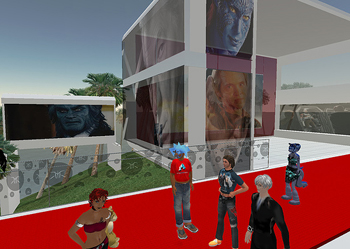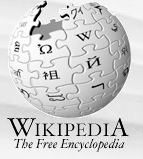 Wired News reported last week, that some users of Flickr were upset at the enforcing of, until now a rarely mentioned, Flickr policy of making non-photographic images unavailable to the public if the account does not mostly contain photographs. Although Flickr is mostly known as a photo sharing site, people often post various digitized images into Flickr including our collaborator, Alex Itin. Currently, users of Second Life are receiving particular attention with Flickr’s posting policies.
Wired News reported last week, that some users of Flickr were upset at the enforcing of, until now a rarely mentioned, Flickr policy of making non-photographic images unavailable to the public if the account does not mostly contain photographs. Although Flickr is mostly known as a photo sharing site, people often post various digitized images into Flickr including our collaborator, Alex Itin. Currently, users of Second Life are receiving particular attention with Flickr’s posting policies.
The article quotes Stewart Butterfield saying, “the rationale is that when people do a global search on Flickr, they want to find photos.”
I can appreciate that Flickr wants to maintain a clear brand identity. They have created one of the most successful open photo sharing websites to date and, they don’t want to dilute their brand. However, isn’t this just a tagging issue? It is ironic that Flickr, one of the pioneering Web 2.0 apps, whose success strongly relies on the power of folksonomy, misses this point. Flickr was one of the primary ways the general public figured out how tagging works, and their users should be able to figure out how to selection what kinds of images they want.
How much of a stretch would it be for Flickr to become an image sharing website, including tags for photographs, scanned analog images, and born digital images?
FInally, Second Life had a recent event with a tie-in to a virtual X-Men movie premiere, whose images made their way into Flickr. When asked to comment about it, Butterfield goes on to say, “Flickr wasn’t designed for Universal or Sony to promote their movie. Flickr is very explicitly for personal, noncommercial use” rather than “using a photo as a proxy for an ad.”
Again, I appreciate their sentiment. However, is there a feasible way to enforce this kind of policy? Is it ok to for me to post a picture of my trip to Seattle, wearing an Izod shirt, holding a Starbucks cups, in front of the Space Needle? Isn’t this a proxy for an ad? As we have noted before, architecture, such as Disneyland, the Chrylser Building and Space Needle are all copyrighted. Our clothes are plastered with icons and slogans. Food and drinks are covered with logos. We are a culture of brands and increasing everything in our lives is branded. It should come to no surprise that the media we, as a culture, produce reflects these brands, corporate identities, and commercial bodies.
The decreases in cost of digital production tools have vastly increased amateur media production. Flickr provides a great service to users of the web to support the sharing of all the media people are creating. However, Flickr created something bigger than they originally intended. Rather than limiting themselves to photo sharing, there is much more potential in creating a space for the sharing of and community building around all digital images.
Category Archives: web_2.0
hmmm… online word processing
Not quite sure what I think of this new web-based word processor, Writely. Cute Web 2.0ish name, “beta” to the hilt. It’s free and quite easy to get started. I guess it falls into that weird zone of transitional unease between desktop computing and the wide open web, where more and more of our identity and information resides. Some of the tech specifics: Writely saves documents in Word and (as of today) Open Office formats, outputs as RSS and to some blogging platforms (not ours), and can also be saved as a simple web page (here’s the Writely version of this post). A key feature is that Writely documents can be written and edited by multiple authors, like SubEthaEdit only totally net-based. It feels more or less like a disembodied text editor for a wiki.
I’m trying to think about what’s different about writing online. Movable Type, our blogging software, is essentially an ultra-stripped-down text editor — web-based — and it’s no fun to work in. That’s partly because the text field is about the size of a mail slot, but writing online can be annoying for other reasons, chief among them the fact that you have to be online to work, and second that you are susceptible to the chance mishaps of the browser (accidentally backing up and losing everything, it crashes, you forgot to pay Time Warner and they turn off the web etc.). But with a conventional word processor you’re vulnerable to the mishaps of the machine (hard drive dies and you didn’t back it up, it crashes and you didn’t save, coffee spills…). Writely saves everything automatically as you go, maintaining a revision history and tracking changes — a very nice feature.
They say this is the future of software, at least for the simple everyday kind of stuff: web-based tool suites and tons of online data storage. I guess it’s nice not having to be tied to one machine. Your work is just out there, waiting for you to log in. But then again, your work is just out there…
questions and answers
in 1980 and 81 i had a dream job — charlie van doren, the editorial director of Encyclopedia Britannica, hired me to think about the future of encyclopedias in the digital era.  i parlayed that gig into an eighteen-month stint with Alan Kay when he was the chief scientist at Atari. Alan had read the paper i wrote for britannica — EB and the Intellectual Tools of the Future — and in his enthusiastic impulsive style, said, “this is just the sort of thing i want to work on, why not join me at Atari.”
i parlayed that gig into an eighteen-month stint with Alan Kay when he was the chief scientist at Atari. Alan had read the paper i wrote for britannica — EB and the Intellectual Tools of the Future — and in his enthusiastic impulsive style, said, “this is just the sort of thing i want to work on, why not join me at Atari.”
while we figured that the future encyclopedia should at the least be able to answer most any factual question someone might have, we really didn’t have any idea of the range of questions people would ask. we reasoned that while people are curious by nature, they fall out of the childhood habit of asking questions about anything and everything because they get used to the fact that no one in their immediate vicinity actually knows or can explain the answer and the likelihood of finding the answer in a readily available book isn’t much greater.
so, as an experiment we gave a bunch of people tape recorders and asked them to record any question that came to mind during the day — anything. we started collecting question journals in which people whispered their wonderings — both the mundane and the profound. michael naimark, a colleague at Atari was particularly fascinated by this project and he went to the philippines to gather questions from a mountain tribe.
 anyway, this is a long intro to the realization that between wikipedia and google, alan’s and my dream of a universal question/answer machine is actually coming into being. although we could imagine what it would be like to have the ability to get answers to most any question, we assumed that the foundation would be a bunch of editors responsible for the collecting and organizing vast amounts of information. we didnt’ imagine the world wide web as a magnet which would motivate people collectively to store a remarkable range of human knowledge in a searchable database.
anyway, this is a long intro to the realization that between wikipedia and google, alan’s and my dream of a universal question/answer machine is actually coming into being. although we could imagine what it would be like to have the ability to get answers to most any question, we assumed that the foundation would be a bunch of editors responsible for the collecting and organizing vast amounts of information. we didnt’ imagine the world wide web as a magnet which would motivate people collectively to store a remarkable range of human knowledge in a searchable database.
on the other hand we assumed that the encylopedia of the future would be intelligent enough to enter into conversation with individual users, helping them through rough spots like a patient tutor. looks like we’ll have to wait awhile for that.
nicholas carr on “the amorality of web 2.0”
Nicholas Carr, who writes about business and technology and formerly was an editor of the Harvard Business Review, has published an interesting though problematic piece on “the amorality of web 2.0”. I was drawn to the piece because it seemed to be questioning the giddy optimism surrounding “web 2.0”, specifically Kevin Kelly’s rapturous late-summer retrospective on ten years of the world wide web, from Netscape IPO to now. While he does poke some much-needed holes in the carnival floats, Carr fails to adequately address the new media practices on their own terms and ends up bashing Wikipedia with some highly selective quotes.
Carr is skeptical that the collectivist paradigms of the web can lead to the creation of high-quality, authoritative work (encyclopedias, journalism etc.). Forced to choose, he’d take the professionals over the amateurs. But put this way it’s a Hobson’s choice. Flawed as it is, Wikipedia is in its infancy and is probably not going away. Whereas the future of Britannica is less sure. And it’s not just amateurs that are participating in new forms of discourse (take as an example the new law faculty blog at U. Chicago). Anyway, here’s Carr:
The Internet is changing the economics of creative work – or, to put it more broadly, the economics of culture – and it’s doing it in a way that may well restrict rather than expand our choices. Wikipedia might be a pale shadow of the Britannica, but because it’s created by amateurs rather than professionals, it’s free. And free trumps quality all the time. So what happens to those poor saps who write encyclopedias for a living? They wither and die. The same thing happens when blogs and other free on-line content go up against old-fashioned newspapers and magazines. Of course the mainstream media sees the blogosphere as a competitor. It is a competitor. And, given the economics of the competition, it may well turn out to be a superior competitor. The layoffs we’ve recently seen at major newspapers may just be the beginning, and those layoffs should be cause not for self-satisfied snickering but for despair. Implicit in the ecstatic visions of Web 2.0 is the hegemony of the amateur. I for one can’t imagine anything more frightening.
He then has a nice follow-up in which he republishes a letter from an administrator at Wikipedia, which responds to the above.
Encyclopedia Britannica is an amazing work. It’s of consistent high quality, it’s one of the great books in the English language and it’s doomed. Brilliant but pricey has difficulty competing economically with free and apparently adequate….
…So if we want a good encyclopedia in ten years, it’s going to have to be a good Wikipedia. So those who care about getting a good encyclopedia are going to have to work out how to make Wikipedia better, or there won’t be anything.
Let’s discuss.
